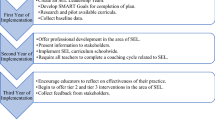Abstract
This article adds to the existing body of data that demonstrates how the use of in-depth case studies that include social episode analysis can deepen the teaching students’ and researchers’ understanding of the perceptions and skills needed for Classroom Management (CM). In this article, CM is defined as a meta-skill that integrates cognitive perceptions (proactive, ecological-systemic, and leadership-oriented), self-regulation skills, and interpersonal relationships with students and colleagues. CM is also perceived as a cyclical process that includes advance planning, implementation, assessment during the implementation, and a final evaluation that takes into account factors related to the children and their environment, intended to bring about progress in the activities carried out for the learning and emotional well-being of the children in the class. Two cases showing opposite positions with regard to social-moral CM were selected from 34 cases documented by second-year, 4-year-track, preservice teaching students enrolled in a CM course in Israel in the spring of 2008. One case shows how, guided by the desire to ensure a child’s well-being, a student developed perceptions and skills related to all components of the CM theoretical framework. The other case shows how opportunities were missed to learn and develop a social-moral, complex, CM perception. Based on an analysis of the two cases, the discussion examines the usefulness of case studies in teacher training and offers insights related to improved teacher training.
Similar content being viewed by others
References
Bandura, A. (1991). Social cognitive theory of self-regulation. Organizational Behavior and Human Decision Processes, 50, 248–287.
Bandura, A. (1997). Self efficacy: The exercise of control. New York: W.H. Freeman and Company.
Barth, R. (1980). Run school run. Boston, MA: Harvard University Press.
Barth, R. (2002). The culture builder. Educational Leadership, 59(8), 6–11.
Blase, J. (2009). The role of mentors of preservice and inservice teachers. In L. Saha & G. Dworkin (Eds.), International handbook of research on teachers and teaching (pp. 171–181). New York, NY: Springer.
Bronfenbrenner, U. (1979). The ecology of human development. Cambridge, MA: Harvard University Press.
Colorado State University (n.d.). Writing@CSU: Case studies. Retrieved April 11, 2010 from http://writing.colostate.edu/guides/research/casestudy/com2a1.cfm.
Doyle, W. (1986). Classroom organization and management. In M. Wittrock (Ed.), Handbook on research in teaching (3rd ed., pp. 392–431). New York, NY: Macmillan.
Doyle, W. (2006). Ecological approaches to classroom management. In C. M. Evertson & C. S. Weinstein (Eds.), Handbook of classroom management research: Practice and contemporary issues (pp. 97–127). NJ: Erlbaum.
Emmer, E. T., & Stough, L. M. (2001). Classroom management: A critical part of educational psychology. Educational Psychologist, 36, 103–112.
Evertson, C. M., & Weinstein, C. S. (2006). Classroom management as a field of inquiry. In C. M. Evertson & C. S. Weinstein (Eds.), Handbook of classroom management: Research, practice and contemporary issues (pp. 3–17). Mahwah, NJ: Erlbaum.
Flyvbjerg, B. (2006). Five misunderstandings about case-study research. Qualitative Inquiry, 12(2), 219–245.
Franke, A., & Dahlgren, L. O. (1996). Conceptions of mentoring: An empirical study of conceptions of mentoring during the school-based teacher education. Teaching and Teacher Education, 12(6), 627–641.
Friedman, I. A. (2010). Evaluation of educational programs: From a black-box to a dynamic, theory-grounded model. In M. Rozalis-Lewin & D. Soya (Eds.), Special issues related to assessment in Israel. Beer Sheva, Israel: Ben Gurion University Press (Hebrew).
Giddings, F. H. (1924). The study of cases. Journal of Social Forces, 2, 643–646. Retrieved April 11, 2010 from http://www.brocku.ca/MeadProject/Giddings/Giddings_1924c.html.
Harré, R., & Secord, P. F. (1972). The explanation of social behavior. Oxford, UK: Basil Blackwell.
Jasper, M. (2003). Beginning reflective practice. Cheltenham: Nelson Thornes.
Kagan, D. M. (1992). Professional growth among preservice and beginning teachers. Review of Educational Research, 62(2), 129–169.
Kazdin, A. E. (1982). Applying behavioral principles in the schools. In C. R. Reynolds & T. B. Gutkin (Eds.), The handbook of school psychology (pp. 501–529). New York: Wiley.
Kounin, J. S. (1970). Discipline and group management in classrooms. NY: Holt, Rinehart & Winston.
Landau, B. (2009). Classroom management. In L. J. Saha & A. J. Dworkin (Eds.), International handbook of research on teachers and teaching (pp. 739–755). New York, NY: Springer.
Lee, K., & Choi, I. (2008). Learning classroom management through web-based case instruction: Implications for early childhood teacher education. Early Childhood Education Journal, 35(6), 495–503.
Pianta, R. C. (1999). Enhancing relationships between children and teachers. Washington, DC: American Psychological Association.
Pintrich, P. R. (2000). Educational psychology at the millennium: A look back and a look forward. Educational Psychologist, 35(4), 221–226.
Scarpaci, R. T. (2006). A case study approach to classroom management. Boston: Allyn & Bacon.
Schon, D. (1983). The reflective practitioner. New York: Basic Books.
Sergiovanni, T. J. (2001). Leadership. What’s in it for schools?. London, UK: Routledge.
Sergiovanni, T. J. (2007). Rethinking leadership. Thousand Oaks, CA: Corwin Press.
Sidorkin, A. M. (2002). Learning relations: Impure education, deschooled schools, and dialogue with evil. New York: Peter Lang Publishing, Inc.
Smyth, J. M., & Pennebaker, J. W. (1999). Sharing one’s story. Translating emotional experiences into words as a coping tool. In I. C. R. Snyder (Ed.), Coping: The psychology of what works (pp. 70–89). New York: Oxford University Press.
Stake, R. E. (1995). The art of case study research. Thousand Oaks, CA: Sage.
Tal, C. (2008). Classroom management: Definition as meta-skill and processes that foster it. Presentation given at the New York AERA 2008 Meeting, 24–28 March.
Tal, C. (in press). Moral classroom management: Definition as a meta-skill and processes that foster it. In: S. B. Thompson (Ed.) Kindergartens: Programs, functions and outcomes . Hauppauge, NY: Nova Books.
Author information
Authors and Affiliations
Corresponding author
Rights and permissions
About this article
Cite this article
Tal, C. Case Studies to Deepen Understanding and Enhance Classroom Management Skills in Preschool Teacher Training. Early Childhood Educ J 38, 143–152 (2010). https://doi.org/10.1007/s10643-010-0395-z
Published:
Issue Date:
DOI: https://doi.org/10.1007/s10643-010-0395-z




